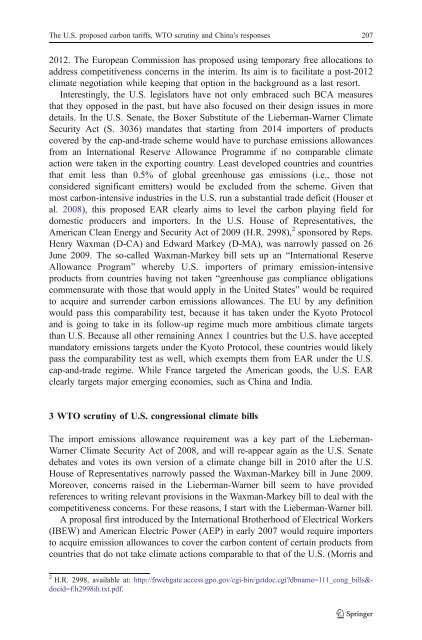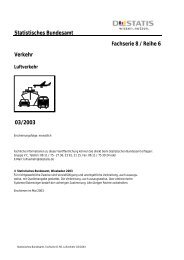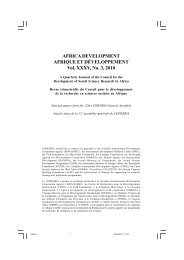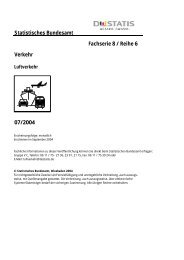The international economics of resources and resource ... - Index of
The international economics of resources and resource ... - Index of
The international economics of resources and resource ... - Index of
Create successful ePaper yourself
Turn your PDF publications into a flip-book with our unique Google optimized e-Paper software.
<strong>The</strong> U.S. proposed carbon tariffs, WTO scrutiny <strong>and</strong> China’s responses 207<br />
2012. <strong>The</strong> European Commission has proposed using temporary free allocations to<br />
address competitiveness concerns in the interim. Its aim is to facilitate a post-2012<br />
climate negotiation while keeping that option in the background as a last resort.<br />
Interestingly, the U.S. legislators have not only embraced such BCA measures<br />
that they opposed in the past, but have also focused on their design issues in more<br />
details. In the U.S. Senate, the Boxer Substitute <strong>of</strong> the Lieberman-Warner Climate<br />
Security Act (S. 3036) m<strong>and</strong>ates that starting from 2014 importers <strong>of</strong> products<br />
covered by the cap-<strong>and</strong>-trade scheme would have to purchase emissions allowances<br />
from an International Reserve Allowance Programme if no comparable climate<br />
action were taken in the exporting country. Least developed countries <strong>and</strong> countries<br />
that emit less than 0.5% <strong>of</strong> global greenhouse gas emissions (i.e., those not<br />
considered significant emitters) would be excluded from the scheme. Given that<br />
most carbon-intensive industries in the U.S. run a substantial trade deficit (Houser et<br />
al. 2008), this proposed EAR clearly aims to level the carbon playing field for<br />
domestic producers <strong>and</strong> importers. In the U.S. House <strong>of</strong> Representatives, the<br />
American Clean Energy <strong>and</strong> Security Act <strong>of</strong> 2009 (H.R. 2998), 2 sponsored by Reps.<br />
Henry Waxman (D-CA) <strong>and</strong> Edward Markey (D-MA), was narrowly passed on 26<br />
June 2009. <strong>The</strong> so-called Waxman-Markey bill sets up an “International Reserve<br />
Allowance Program” whereby U.S. importers <strong>of</strong> primary emission-intensive<br />
products from countries having not taken “greenhouse gas compliance obligations<br />
commensurate with those that would apply in the United States” would be required<br />
to acquire <strong>and</strong> surrender carbon emissions allowances. <strong>The</strong> EU by any definition<br />
would pass this comparability test, because it has taken under the Kyoto Protocol<br />
<strong>and</strong> is going to take in its follow-up regime much more ambitious climate targets<br />
than U.S. Because all other remaining Annex 1 countries but the U.S. have accepted<br />
m<strong>and</strong>atory emissions targets under the Kyoto Protocol, these countries would likely<br />
pass the comparability test as well, which exempts them from EAR under the U.S.<br />
cap-<strong>and</strong>-trade regime. While France targeted the American goods, the U.S. EAR<br />
clearly targets major emerging economies, such as China <strong>and</strong> India.<br />
3 WTO scrutiny <strong>of</strong> U.S. congressional climate bills<br />
<strong>The</strong> import emissions allowance requirement was a key part <strong>of</strong> the Lieberman-<br />
Warner Climate Security Act <strong>of</strong> 2008, <strong>and</strong> will re-appear again as the U.S. Senate<br />
debates <strong>and</strong> votes its own version <strong>of</strong> a climate change bill in 2010 after the U.S.<br />
House <strong>of</strong> Representatives narrowly passed the Waxman-Markey bill in June 2009.<br />
Moreover, concerns raised in the Lieberman-Warner bill seem to have provided<br />
references to writing relevant provisions in the Waxman-Markey bill to deal with the<br />
competitiveness concerns. For these reasons, I start with the Lieberman-Warner bill.<br />
A proposal first introduced by the International Brotherhood <strong>of</strong> Electrical Workers<br />
(IBEW) <strong>and</strong> American Electric Power (AEP) in early 2007 would require importers<br />
to acquire emission allowances to cover the carbon content <strong>of</strong> certain products from<br />
countries that do not take climate actions comparable to that <strong>of</strong> the U.S. (Morris <strong>and</strong><br />
2<br />
H.R. 2998, available at: http://frwebgate.access.gpo.gov/cgi-bin/getdoc.cgi?dbname=111_cong_bills&docid=f:h2998ih.txt.pdf.








